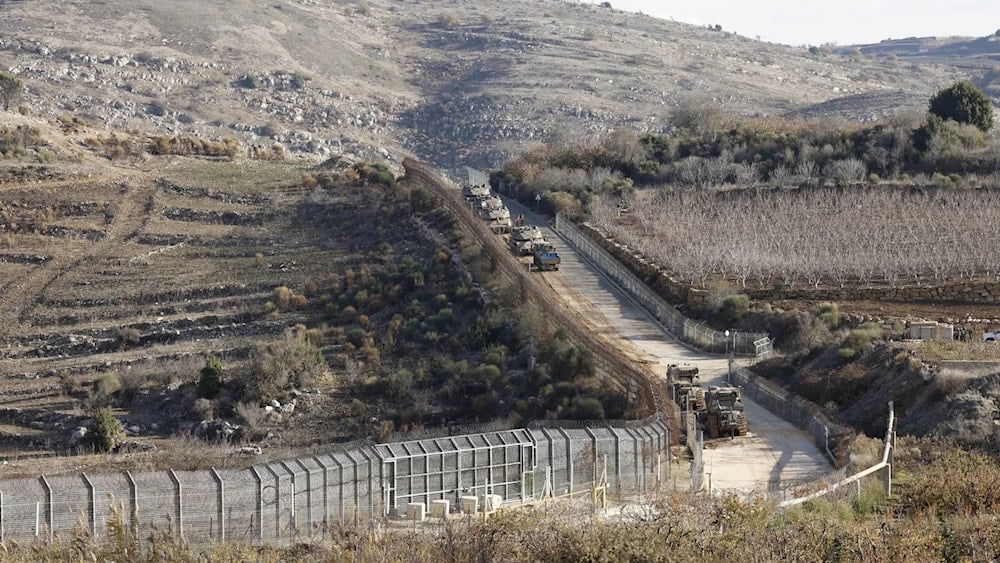'Israel' and Jordan engage in secret talks on Syria's future: Axios
According to Axios, Jordan has acted as a mediator between "Israel" and new regime forces.
-

Israeli tanks take position on the border with Syria near the Druze village of Majdal Shams in the occupied Golan Heights on December 8, 2024. (AFP)
"Israel" and Jordan held secret talks on Friday to coordinate on the evolving situation in Syria, Axios reported, citing three Israeli officials
Since the fall of the Syrian regime, Israeli occupation forces have been conducting strikes on military sites across Syria and have occupied territory in the Golan Heights on the Syrian side of the border. Syria's mission to the United Nations has described these actions as violations of its sovereignty.
Both "Israel" and Jordan, which also shares a border with Syria, aim to address mutual security concerns, as per the report.
An Israeli official said, as quoted by Axios, that Jordan has also acted as a mediator between "Israel" and new regime forces, including Hayat Tahrir ash-Sham (HTS), which played a major role in toppling Assad, adding that senior members of "Israel's" Shin Bet security agency and Israeli army met with Ahmad Husni, the head of Jordan’s General Intelligence Directorate, and senior Jordanian military leaders.
The discussions reportedly covered the situation in Syria, as well as both sides' engagement with the new regime forces currently working to form a transitional government, as per the report.
The report added that "concerns about weapons smuggling by Iran through Jordan to armed groups [Palestinian resistance factions] in the Israeli-occupied West Bank, which could escalate violence in Palestinian territories, were also raised."
Neither the Israeli army, Shin Bet, nor the Jordanian Embassy in Washington, D.C., commented on the talks, the report stressed.
The secret talks between "Israel" and Jordan come amid growing concerns within Jordan’s political circles about potential instability that could threaten the country’s regime. The sudden collapse of Syria’s government has amplified fears that regional upheaval might spill over into Jordan, putting additional strain on its political and social fabric.
This backdrop adds urgency, as Jordan, a core US ally in the Middle East, seeks to address the broader implications of the Syrian crisis while safeguarding its stability, given its strategic importance to the Israeli occupation.
The big picture
In the past 10 days, the Israeli military has begun occupying parts of Syrian territory in the border zone established after the October 1973 War. Israeli forces have also occupied strategic sites, such as Mount Hermon, and have carried out nearly 500 airstrikes targeting Syrian military assets.
Israeli Prime Minister Benjamin Netanyahu told US National Security Advisor Jake Sullivan on Thursday that the Israeli military "would temporarily maintain control of the border area until an effective force enforces the 1974 Separation of Forces Agreement." Israeli officials suggested the Israeli occupation forces' "presence in the zone could continue for months or longer."
In response, Syria's mission to the United Nations condemned "Israel's" actions in a letter to the UN Security Council, describing them as violations of the 1974 agreement and Syrian sovereignty. The letter emphasized the need for the UN to compel "Israel" to halt its attacks and withdraw from the occupied zones.
The Syrian ambassador to the UN stated, "At a time when the Syrian Arab Republic is witnessing a new phase in its history in which its people aspire to a state of freedom, equality, social justice, the rule of law, peace, and stability, the Israeli occupation army has escalated its ongoing aggression on the territory of the Syrian Arab Republic."
The letter also called on the international community to ensure Israel respects the disengagement lines. The leader of Hayat Tahrir ash-Sham (HTS) Ahmad al-Sharaa, also known as Abu Mohammad al-Jolani, described "Israel's" actions as "an unjustified escalation," adding, "Israel doesn't have any reason to cross the disengagement line, especially because Iran is no longer present in Syria… Without its ally Assad, [Iran] will no longer be able to use Syria as a launching ground for attacks."
Al-Sharaa stressed the importance of prioritizing reconstruction and stability over new conflicts, urging the international community to pressure "Israel" to respect Syrian sovereignty.

 4 Min Read
4 Min Read








